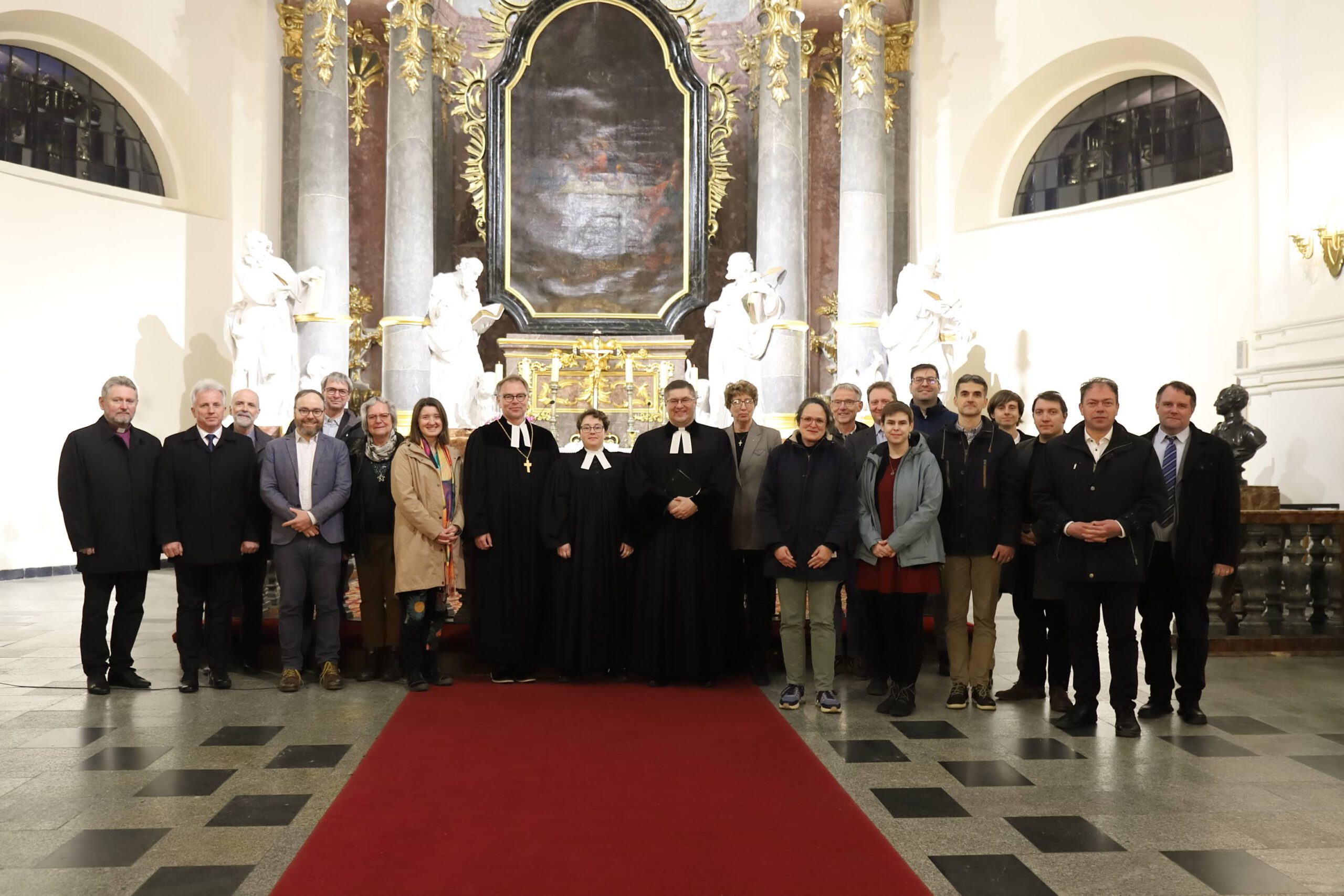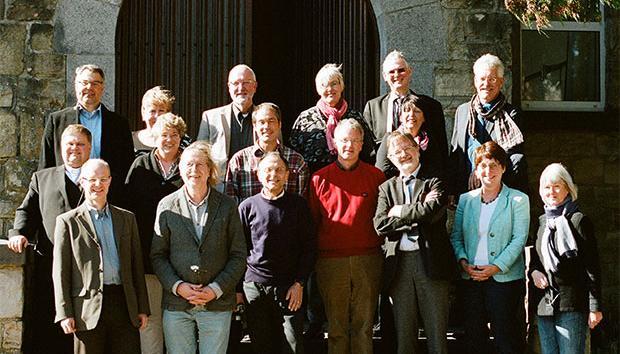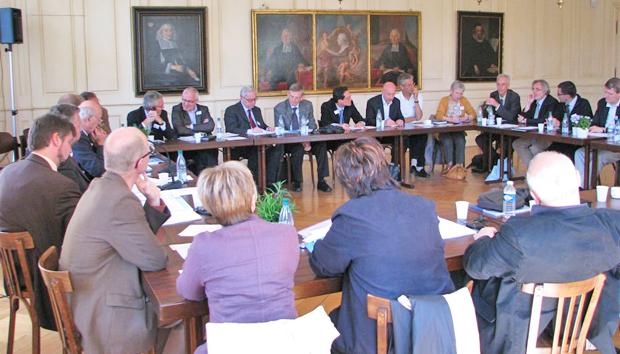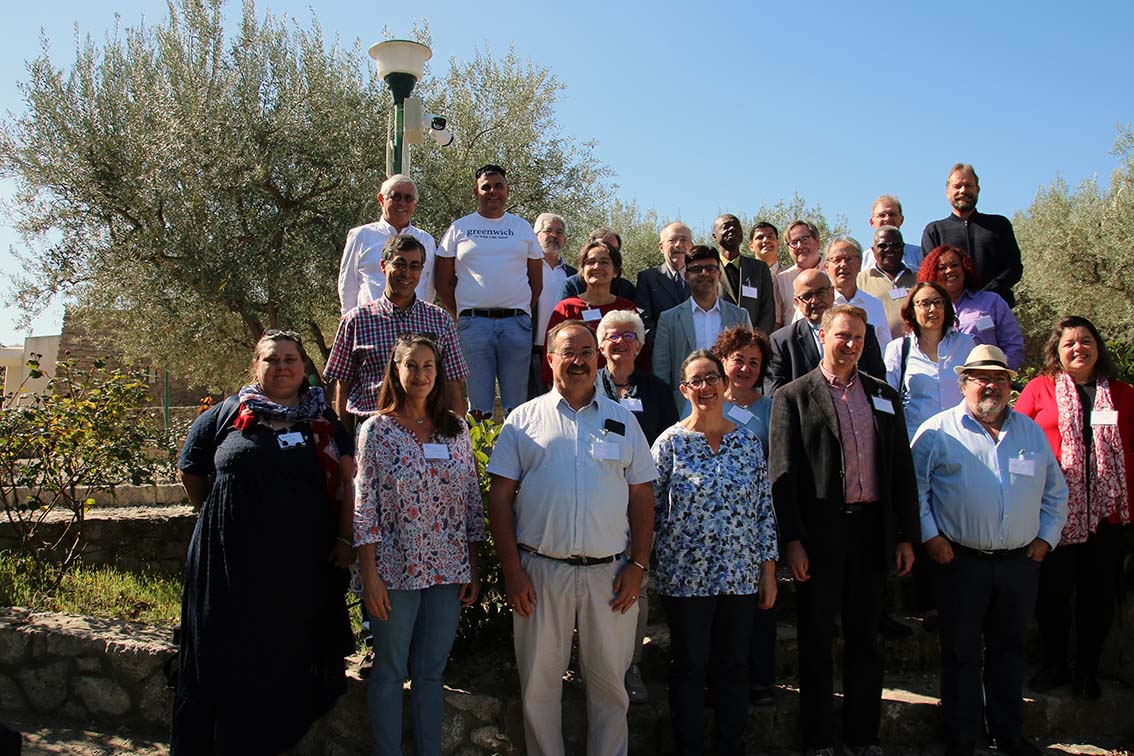Regional Groups
Many churches have formed regional groups to strengthen cooperation among themselves and enrich the life of the churches. Regional groups are thus a way of living out church communion. They are organs of the communion in accordance with the CPCE Statutes.
Regional groups such as the South East Europe Group and the North West Europe Group are committed to the work of the entire church communion. Even before the Leuenberg Agreement, the Protestant churches along the Rhine had joined together to form the Conference of Churches on the Rhine (CERR/KKR), which became a regional group of the CPCE. Similarly, the Conference of Protestant Churches in Latin Europe (CEPPLE) also became a regional group of the CPCE.
CPCE member churches in other regions also work closely together without formal creation of a regional group, such as the churches on the River Plate in South America or the churches on the Baltic Sea.
North West Group
The meetings within the framework of the “Leuenberg North West Group” go back to an initiative of the late Rhineland Praeses Peter Beier. In 1990 the initial core of the group was formed by the United Protestant Church in Belgium, the Evangelical Church of the Rhineland and the three Reformation churches from the Netherlands. Later, other German churches joined, as well as churches from Luxembourg and Alsace, so that today ten churches from four countries belong to the North West Group.
Since 1991 there have been annual conferences at various places in Europe: Brussels, Hofgeismar, Düsseldorf, Kloster Frenswegen in Nordhorn, Utrecht, Mülheim, Stapelage, Luxembourg, Antwerp, Strasbourg, Bielefeld and Kassel. Primarily the leading clergy of the churches and members of the church governments take part. The topics are always chosen with a view to their topicality for the member churches, e.g. “Church and Israel”, “Evangelising – Protestant Perspectives for the Churches in Europe” or “The Shape and Shaping of Protestant Churches in a Changing Europe”. Alongside the themes mentioned, which served as preparation for the General Assemblies in Belfast and Budapest, important concerns for the North West Group are cultivating Euregio work, care of migrants and asylum-seekers, and an intensive exchange over the situation of member churches.
Member Churches
Reformed Synod of Denmark
Church of Scotland
Methodist Church in Ireland
Evangelical Lutheran Church in Oldenburg
Evangelical Church of Westphalia
Church of Lippe
Evangelical Reformed Church
Evangelical Church in the Rhineland
Evangelical Church of Kurhessen-Waldeck
United Methodist Church Central Conference of Germany
United Protestant Church of Belgium
Protestant Church in the Netherlands
Protestant Church of Luxembourg
Protestant Reformed Church of Luxembourg
Remonstrant Brotherhood
Contact Person
Thomas Kraft
Ev. Kirche i. Rheinland
Böckler Str 7
40476 Düsseldorf, Deutschland
E-Mail: thomas.kraft@ekir.de

Contact Person
Raphael Quandt
Ev.-Luth.Kirche in Bayern
Katharina von Bora Str. 11-13
80333 München
Mail: raphael.quandt@elkb.de
South East Europe Group
In 1975, Bishop Hanselmann wanted to give an indication that the Leuenberg Church Fellowship was not just remaining a document but was taking shape as a living communion of churches. With the signing of the Agreement by Bavaria he called to life a regional group which made possible exchanges between churches over the Iron Curtain. As well as holding important theological discussions, which have been recorded in the publications of the Leuenberg Church Fellowship, the meeting of the regional group on neutral ground in Gallneukirchen in Austria was for many representatives of the churches in the East one of the few possibilities of keeping in contact with their Western brothers and sisters.
Though for a long time predominantly bishops and church leaders came to the regional group in Gallneukirchen, many young theologians, men and women, are now delegated to this body, and of course they bring to it the concerns and situations of their churches. At present the focus of work is on a study of changes to worship in the member churches. This year's topical theme, “Dealing with the past under totalitarian regimes”, is also allotted sufficient room for discourse.
With 28 member churches from Switzerland to Russia and from Poland to Italy and Bulgaria, the South East Europe Regional Group is not only the oldest but also the largest regional group of the CPCE.
Member Churches
Evangelical Church of the Augsburg Confession in Romania
Evangelical Lutheran Church in Romania
Evangelical Church of Czech Brethren
Evangelical Lutheran Church in Italy
Waldensian Evangelical Church
German Evangelical Lutheran Church in Ukraine (member of ELCROS)
Evangelical Church Augsburg Confession of Slovenia
Evangelical Church of the Augsburg Confession in Austria
Evangelical Church of Palatinate
Evangelical Church of the Helvetic Confession in Austria
Protestant Church of Liechtenstein
Evangelical Church in Baden
Evangelical Lutheran Church in Württemberg
Evangelical Lutheran Church in Bavaria
Evangelical Church in Central Germany
Federation of the Evangelical Lutheran Churches in Russia and Other States ELCROS
United Methodist Church Central Conference of Central and Southern Europe, represented by Austria and Serbia
Evangelical Reformed Church
Evangelical Church of the Augsburg Confession in the Slovak Republic
Reformed Christian Church in Serbia
Reformed Church in Transcarpathia
Evangelical Church of the Augsburg Confession in Poland
Evangelical-Lutheran Church in Hungary
Reformed Church in Hungary
Reformed Christian Church in Slovakia
Reformed Church in Romania
Protestant Church in Switzerland
Silesian Evangelical Church of the Augsburg Confession
Slovak Evangelical Lutheran Church in Serbia
Conference of the Churches on the Rhine (CCR/KKR)
Twelve years before the signing of the Leuenberg Agreement an alliance of churches had formed along the Rhine which practised an ecumenism within Protestantism. After the Second World War this alliance, the Conference of Churches on the Rhine (CCR), made it its task to play its part in the new peaceful Europe which was taking shape. The Rhine, for many decades and centuries a line of demarcation, was to become the symbol of solidarity and reconciliation in Europe.
For its first meeting in 1961 the CCR came together on the Liebfrauenberg in Alsace/France. Initially no sequel to the meeting was envisaged. But the conversations and encounters with the sister churches of neighbouring countries proved so stimulating and fruitful that such meetings were also planned for the future. From the very beginning that work of the churches along the Rhine which crosses frontiers lay at the centre of interest. In time three forms of collaboration became established. First, the CCR organizes annual conferences on topical European themes. Secondly, over and above the thematic work, these conferences offer the possibility of encounter and reciprocal exchanges between the churches and so lay the foundation for common projects which cross frontiers. Thirdly, in the late 1970s, the CCR took the initiative to establish an ecumenical secretariat within the European institutions in Strasbourg, which over time evolved into the current CPCE office in Strasbourg, linked to the Council of Europe. The CEPE is a member with participatory status of the Conference of INGOs.
As all the member churches of the CCR are likewise signatory churches of the Leuenberg Agreement, in recent years the idea has taken shape of also incorporating the CCR institutionally into the CPCE as a regional group. At the CCR conference in May 2008 this process was completed with the signing of an agreement to become a regional group. The CCR works on current European issues, particularly democracy. It organises cross-border meetings and projects with a focus on young people.
Member Churches
Reformed Church in Aargau
Evangelical Church of Baden
Evangelical Reformed Church of Basel Land
Evangelical Reformed Church of Basel Stadt
Evangelical Lutheran Church in Alsace and Lorraine
Evangelical Reformed Church in Alsace and Lorraine
Evangelical Church in Hesse und Nassau
Evangelical Church in the Principality of Liechtenstein
Evangelical Church of the Helvetic Confession in Austria
Evangelical Church of Palatine
Evangelical Church of the Rhineland
Evangelical Reformed Church of Schaffhausen
Evangelical Reformed Church of St. Gallen
Evangelical Lutheran Church in Württemberg
Contact Person
Sibylle Klumpp
Union des Églises protestantes d’Alsace et de Lorraine
1 bis quai Saint Thomas
BP 80022
Strasbourg cedex, France
Mail : kkr-cerr@uepal.fr
Contact Person
Dr. Ulrich Rüsen Weinhold
47, rue Clichy
F-75009 Paris, FRANCE
Mail: ulrich.weinhold@epudf.org
GSM: +33 6 48 92 60 55
Conférence des Eglises protestantes des Pays latins d’Europe (CEPPLE)
1950 – Constitution du Conseil Oecuménique des Eglises. Souci de solidarité entre Eglises, préoccupation de la situation précaire des protestants en Italie, et des entraves à la liberté religieuse dont souffrent les Eglises protestantes en Espagne et au Portugal, alors même que vient d’être adoptée par l’ONU la Déclaration Universelle des Droits de l’Homme. La CEPPLE naît de cette préoccupation à l’instigation du Pasteur Marc Boegner.
En septembre 1950, à l’initiative du Département d’Entraide des Eglises du COE, Première Conférence CEPPLE à Torre-Pellice … Thème de l’assemblée : “Grandeur et misère des Eglises minoritaires“ que développe le pasteur Visser’t Hooft, Secrétaire Général du COE.
Avec le temps, le sentiment de développe que dans leur fragilité, les Eglises dites minoritaires sont porteuses pour d’autres d’une parole d’avenir. Assemblée Générale (AG) à Leysin (Suisse) en octobre 1963 : Notre situation minoritaire, si nous l’entendons comme une vocation et non comme une réalité sociologique, peut aider l’Eglise d’aujourd’hui à se comprendre comme minorité. Un second point à l’ordre du jour : la question des migrations. Le professeur André Philip, économiste protestant, adepte du christianisme social, intervient : le problème n’est pas nouveau, mais il se posera avec acuité dans les vingt prochaines années. L’émigration ne sera plus principalement intra-européenne, mais elle viendra d’Afrique. D’où l’invitation pressante aux Eglises à travailler cette question, et la décision de l’assemblée de l’inscrire dans son programme pour l’avenir.
AG en septembre 1968, au Chambon-sur Lignon (121 participants, les travaux durent une semaine). Exposé du Professeur H. d’Espine, de la Faculté de Théologie de Genève : La situation du protestantisme dans les pays latins implique une vocation spécifique qu’il définit par quatre éléments : l’évangélisation, la lutte pour la liberté religieuse, un ministère prophétique, une responsabilité à l’égard de régions extra-européennes (Afrique, Amérique latine). Trois conditions pour répondre à cette vocation : un renouveau spirituel, une solidarité (spirituelle et matérielle), une plus grande unité.
AG à Lisbonne en 1975 – Après la révolution des oeillets (renversement du régime de Salazar) réunion de la conférence des Facultés de théologie des pays latins, un des plus anciens et des plus durables réseaux de la CEPPLE.
Peu à peu s’est tissé un réseau de relations et d’échanges au travers de l’Eglise Réformée de France (EPUdF), avec l’Eglise évangélique de Rhénanie (EKIR), une histoire entre Eglises latines et Eglises du Nord, ainsi qu’avec plusieurs Eglises de l’Est, affrontées dans des contextes différents à des défis comparables.
En 2014, lors de l’AG de Malaga, la CEPPLE est devenue le 4è groupe régional de la CEPE, le pasteur Alfredo Abad, Président de la Commission permanente de Eglise Evangélique Espagnole, a été élu président. Depuis, les activités de la CEPPLE se formalisent autour de 4 pôles : les échanges catéchétiques - la formation théologique - le rôle des Eglises du sud face à la migration - la réflexion et la mutualisation des ressources en matière de présence des Eglises dans les médias et le WEB. Après une AG à Lisbonne en 2018, la dernière Assemblée Générale de la CEPPLE s’est tenue à Riesi en Sicile ; le thème du colloque : Frontières qui se recomposent, théologies en tension, demeurer ensemble Eglises protestantes vivantes, au sud de l’Europe. Le pasteur Pasteur Gianni Genre, de l’Eglise Vaudoise d’Italie a été élu président.
Member Churches
Belgique
- Eglise Protestante Unie de Belgique
Espagne
- Eglise Evangélique Espagnole
France
- Eglise Protestante Unie de France
- Union Nationale des Eglises Protestantes Réformées Evangéliques de France
- Fédération des Eglises Evangéliques Baptistes de France
Italie
- Eglise Vaudoise d'Italie
- Eglise Méthodiste d'Italie
- Union chrétienne Evangélique Baptiste d'Italie
Portugal
- Eglise Evangélique Presbytérienne du Portugal
- Eglise Evangélique Méthodiste du Portugal
- Eglise Catholique Apostolique Evangélique Lusitanienne
Suisse
- Eglise Evangélique Réformée du canton de Vaud
- Eglise Protestante de Genève
- Eglise Réformée Evangélique de Neuchâtel
- Union Synodale Berne-Jura
- Eglise Evangélique réformée du canton de Fribourg
- Eglise Réformée Evangélique du canton du Valais
- Eglise Evangélique Réformée du canton des Grisons



